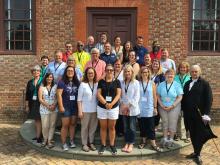 This year, NCSS embarked on a unique partnership with Colonial Williamsburg’s Teacher Institute to host our annual Summer Leadership Institute (SLI). There are many leadership development and training programs out there, yet I think that few programs are tailored to the unique needs of content-area leadership. NCSS tested a different approach in supporting personal leadership in the social studies. Our premise was both simple yet unique: How can we explore the opportunities and challenges of leading within – and for – our discipline?
This year, NCSS embarked on a unique partnership with Colonial Williamsburg’s Teacher Institute to host our annual Summer Leadership Institute (SLI). There are many leadership development and training programs out there, yet I think that few programs are tailored to the unique needs of content-area leadership. NCSS tested a different approach in supporting personal leadership in the social studies. Our premise was both simple yet unique: How can we explore the opportunities and challenges of leading within – and for – our discipline?
Colonial Williamsburg was an outstanding setting to explore leadership. First, the chance to engage in a beautiful setting that is both a 300-acre living history museum and an active municipality gave a fresh focus to our agenda. We were treated to a wide open expanse to consider leadership lessons from the perspectives of individuals who were important in our colonial history. Yes, we met George Washington and Thomas Jefferson, and grappled with the very same questions they faced in establishing our nation’s core values and principles. We also met other individuals whose ideals helped to shape our early nation and provided important leadership case studies. There was Ann Wager, mistress of the Bray School, who taught African-American children to read in colonial Williamsburg. Gowan Pamphlet, an enslaved tavern worker and preacher who helped establish an African-American Baptist church in the colonial capital. Our participants came from many states and abroad. Our leadership focus moved quickly from the personal to the communal. We were explorers together, thinking about how to lead in the future by drawing vital lessons from our past – in the very place where these lessons unfolded. Our historical interpreters used the primary source writings of our colonial leaders. I think this is a strong new model for leadership development, and it perfectly fits with our NCSS mission and social studies inquiry framework.
In Transforming Leadership, James MacGregor Burns gives a name to our experience: collective leadership. He describes this through an example of the creation of our Declaration of Independence. “If the declaration was a call to leadership, its making was itself a supreme act of collective leadership….As an act of collective intellectual leadership, the declaration sprang from decades of philosophical and political controversy in America and Europe. Jefferson and his fellow rebels had not only been schooled in the classics…but they had been steeped in the new thinking of their own day” (p. 77). This quotation shows the contrast between our tendency to distinguish individual leaders relative to others for their accomplishments. Individually, Washington and Jefferson may have more individual prominence than Wager or Pamphlet in our public consciousness; yet together, they form a clear vision that our history was ultimately forged by leaders on multiple levels – from community to national. Their collective leadership in the colonial era – even if they may have never directly interacted together in person – transformed us from a land of distinct colonies to an eventual nation of united states. Many features of our independent colonial past prevail (separation of powers, borders, flags, and laws to name a few), yet we are ultimately organized around the collective, for the common good, in order to achieve consensus.
I came to Colonial Williamsburg seeking to learn from my ancestors in order to be a better leader for our community; I left recognizing the power of our collective leadership in building that community. Each of us walks a different leadership path. We may be classroom, building, organization, or community leaders. We have different learning needs and styles. We meet challenges and seek opportunities unique to our own time and place. Our leadership paths may begin individually, but our leadership goals are achieved collectively.
Although this year’s SLI just concluded, I welcome feedback on our agenda. Please feel free to contact me if this type of leadership development experience is one you would like NCSS to expand upon and offer again.
Reference
Burns, J. M. (2003). Transforming Leadership. New York: Grove Press.